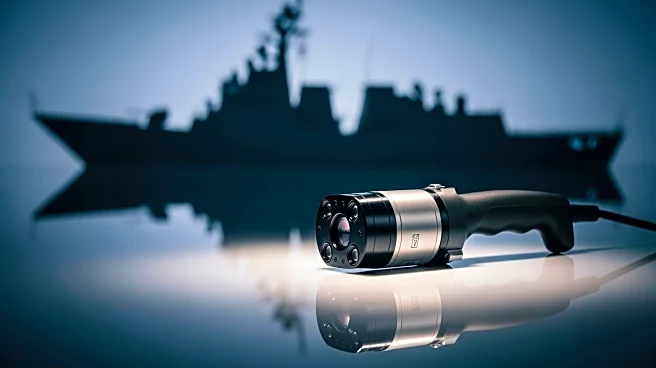What's Happening?
The European Union is working to enhance its authority to inspect vessels within Russia's shadow fleet, according to a document prepared for an upcoming meeting of EU foreign ministers. The document, seen by POLITICO, outlines a draft declaration aimed
at reinforcing the International Law of the Sea framework. This initiative would provide EU member states with additional tools to enforce sanctions, including the ability to board shadow fleet ships for inspections. The draft declaration suggests possible bilateral agreements between the EU and flag states for pre-authorized boardings. The EU's top diplomat, Kaja Kallas, is expected to seek authorization from the Council to negotiate these agreements. The document highlights a growing momentum among EU member states for more robust enforcement actions, citing a recent incident where French soldiers boarded an oil tanker believed to be part of Russia's shadow fleet.
Why It's Important?
This development is significant as it represents the EU's ongoing efforts to tighten sanctions enforcement against Russia, particularly in the context of the ongoing conflict in Ukraine. By enhancing its ability to inspect and potentially disrupt the operations of Russia's shadow fleet, the EU aims to curb the flow of Russian oil and other resources that may be circumventing existing sanctions. This move could impact global oil markets, as it may lead to further restrictions on Russian oil exports. Additionally, it underscores the EU's commitment to maintaining pressure on Russia through coordinated international efforts, potentially influencing diplomatic relations and economic policies within the region.
What's Next?
The EU plans to finalize the draft declaration by the end of November, with the goal of adopting it at the subsequent meeting of EU foreign ministers. If member states support the declaration, the EU will proceed with negotiations for bilateral agreements with identified flag states. These agreements would facilitate pre-authorized boardings for inspections, enhancing the EU's enforcement capabilities. The outcome of these negotiations and the level of cooperation from flag states will be crucial in determining the effectiveness of the EU's strategy. Stakeholders, including political leaders and the shipping industry, will likely monitor these developments closely, as they could have significant implications for international trade and maritime law.















